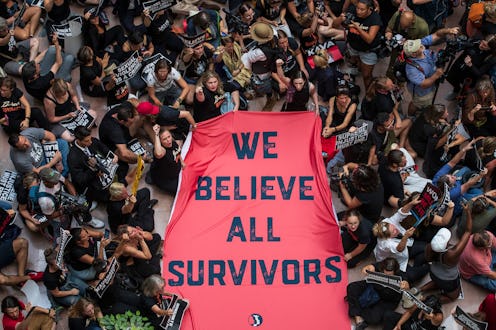
In the Internet age, URLs are often weaponized as a subversive way to help spread certain points of view. One of the latest examples of this is the BrettKavanaugh.com website, which lists resources for sexual assault survivors. But while Kavanaugh is a relatively new addition to the public consciousness, the website has been on reserve for several years, set aside should he ever be nominated to the Supreme Court.
"Three years ago, I bought a handful of URLs that I thought might be useful in any forthcoming Supreme Court confirmation battles," Fix the Court executive director Gabe Roth said in a statement. "Included were BrettKavanaugh.com, .org and .net. Today I am redirecting those three to a landing page with resources for victims of sexual assault."
The website is headlined "we believe survivors," and includes links to some of the country's most prominent anti-sexual violence organizations. They include the Rape, Abuse & Incest National Network (RAINN), End Rape on Campus (EROC), and the National Sexual Violence Resource Center (NSVRC).
"The start of Brett Kavanaugh's tenure on the Supreme Court may look like a victory for one interest group or another, the webpage reads. "But, more importantly, it is putting a national focus on the issue of sexual assault — and how we as a country can and should do more to prevent it and to support those who have experienced it. This past month, thousands of survivors came forward to tell their stories. We applaud your bravery. We believe you."
Fix the Court describes itself on its website as a "non-partisan grassroots organization created to take the Supreme Court to task for its lack of accountability and transparency." Though it is not immediately obvious that the group is behind the content listed on BrettKavanaugh.com, there is a link to their webpage at the very bottom of the homepage.
While the organization describes itself as non-partisan, Kavanaugh's confirmation to the Supreme Court was anything but. For months, Democrats and Republicans fiercely battled over Kavanaugh's nomination, sometimes unable to agree whether President Donald Trump should have been allowed to submit a nominee at all. But that contention was amplified tenfold when three women accused Kavanaugh of sexual assault, all of which he denied.
The first accuser, Christine Blasey Ford, garnered the most attention. She was the only accuser to be granted a hearing in front of the Senate Judiciary Committee — a hearing which dominated public discourse during the week in which it took place. Before and during the hearing, Ford said that Kavanaugh sexually assaulted her at a party when the pair were teenagers. According to Ford, she was 15 years old at the time and Kavanaugh was 17 years old. Kavanaugh repeatedly denied this accusation, saying in a statement, "This is a completely false allegation. I have never done anything like what the accuser describes — to her or to anyone."
Already, analysts have begun discussing how, and to what extent, the Kavanaugh confirmation process may have re-shaped the way that people in the United States are going to view and respond to nominations in the future. And, as Fix the Court pointed out on BrettKavanaugh.com, it very visibly initiated a conversation about how sexual assault reporting functions in the United States.